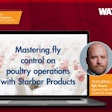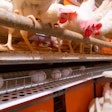
In a WATT Poultry Chat interview, Dr. Stéphane Lemiere, Global Technical Director, Avian, with Boehringer Ingelheim looks at the latest developments in Newcastle disease vaccination.
Mark Clements: Hello and welcome to WATT Poultry Chat. I’m Mark Clements, editor of Poultry International, and today we’re speaking to Dr. Stéphane Lemiere, Global Technical Director, Avian, with Boehringer Ingelheim, about Newcastle disease.
Boehringer Ingelheim believes that prevention is better than cure, and therefore focuses on developing innovative solutions in the areas of vaccines. With a rich product line of advanced preventive health products, tools and services, the company helps its clients in caring for the health of their animals.
Hello Stéphane, thank you for joining us. To start with, perhaps could you tell us a little bit about why Newcastle disease is such an issue for the global poultry industry?
Stéphane Lemiere: Hello Mark. Newcastle disease has been around for a long time, more than almost one century, but it’s still a major challenge for the industry. It’s deadly, so, for sure, it has a significant economic impact on all segments of both the broiler and layer industries. There is no treatment, it’s a viral disease, and the only way to protect flocks is through vaccination and also biosecurity.
Mark Clements: So, all producers should be following good biosecurity procedures, and there are established protocols, and vaccination has been practiced since the 1950s, but perhaps you could tell us something about latest developments in vaccine technology for Newcastle disease.
Stéphane Lemiere: Yes, for sure, vaccine research on Newcastle disease, a viral disease, has been productive during the last decades. Vaccine development used the most recent technological platforms, such as the vector virus technology. In a nutshell, it is just about bioengineering and designing HVT vector vaccines for hatchery application in ovo or at hatch. HVT means herpes virus of turkeys. Certain vector vaccines may express antigen of the most prevalent genotype of the Newcastle disease virus. This is very important and most recent moves led to double insertion technology: Newcastle and infectious bursal disease into the HVT.
Mark Clements: Thanks Stephane, so you have mentioned what we should look for in choosing a hatchery vaccine, and obviously, we know that good biosecurity is essential — what else can we do to protect flocks?
Stéphane Lemiere: Vaccination in the hatchery is the first step in ensuring that flocks are given the best possible start. Capitalizing on the immune foundation — the early protection against the main immunosuppressive viruses, such vaccines control disease challenges of the flocks, that means mortality or technical issues, field virus shed and spread, especially the Newcastle disease. This disease is controlled in most parts of the world by applying a full vaccination program based on vector vaccines, live vaccines, and possibly inactivated vaccines, particularly in long-lived birds. Programs vary according to disease challenge.
Mark Clements: Thanks. Is there anything else that producers should do protect their flocks?
Stéphane Lemiere: Yes. A Newcastle vaccination program needs to be customized to reflect local conditions and needs to be adapted to meet specific disease challenges. Mark, it is worth remembering that Newcastle disease costs the global industry in excess of $500 billion per annum, that is an estimate, so it really is worth taking the time to ensure that all the necessary steps are followed to prevent the disease that choice of vaccine, especially the vector vaccine, especially reflects prevalent genotype.
Mark Clements: Well, Stéphane, thanks so much for joining us today, that was highly informative. For more information on the products and services offered by Boehringer Ingelheim simply visit: www.bi-vetmedica.com/species/poultry.html. Thank you, everybody, for joining Poultry Chat today. Goodbye.
















